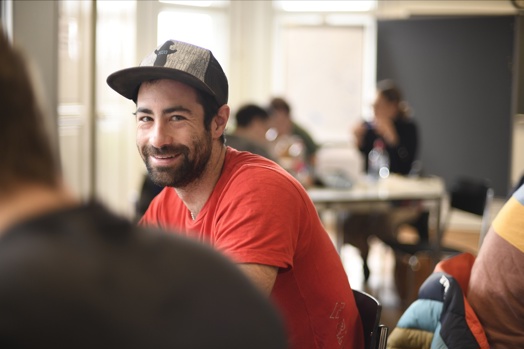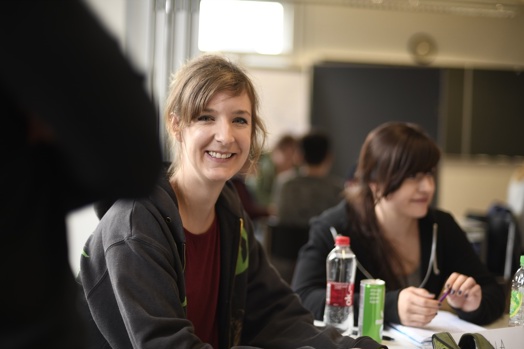Vocational trainer course: Experience report BFF Head of continuing education, further training and lecturer - learning to plan and implement in-company training for learners

Who are you?
My name is Christoph Urech and I am head of the continuing education, further training department at BFF - Kompetenz Bildung Bern. In this role, I am also responsible for the vocational trainer courses and teach the subject area of psychology for prospective vocational trainers.
What is your professional background?
Originally I am a sports and biology teacher (upper-secondary level), I was a trainer of young people for 10 years and worked as an expert at Jugend und Sport in the training of trainers. In addition to sports and biology, I also studied psychology and graduated with an M Sc degree. I have also been teaching on the vocational training course at the BFF Bern for 10 years. In connection with my role as head of department, I have completed various management training courses, including an MAS in education management.

Lecturer Christoph Urech
Who is the vocational trainer course particularly suitable for and why is it important to complete a vocational trainer course?
Our vocational trainer courses are suitable for all (future) vocational trainers who train apprentices at upper-secondary level (Federal VET Diploma and Federal VET Certificate). Based on the Vocational Training Act (BBG) and the Vocational Training Ordinance (BGV), the vocational training offices of the cantons grant companies/training companies permission to train apprentices. One of the requirements is that trainers have completed a minimum 5-day vocational trainer course (40 course hours) in accordance with the SERI framework curriculum of 01.02.2011 and the SBBK curriculum of 04.08.2016. This is completed with a cantonally recognized course certificate as a vocational trainer, which is valid throughout Switzerland. This ensures the quality of in-company training.
The following educational objectives are covered by the vocational trainer course, including the course certificate:
- Educational objective: Dealing with learners
- Educational objective: Planning and implementation of in-company training
- Educational objective: Consideration of individual abilities
- Educational objective: Framework conditions for vocational training
The training objectives are further broken down into required competencies and dealt with in the course for vocational trainers.

Exchange in the BFF vocational trainer course
As an educational institute, do you offer a vocational training course for a specific industry or profession?
Our vocational trainer courses are generally sector-neutral. This means that people from all professions take part in this continuing education, further training to become a vocational trainer. Feedback from participants about the vocational trainer course clearly shows that the vast majority appreciate this fact. The exchange beyond one's own sector in a vocational trainer course is seen as an enrichment. After all, the challenges involved in supporting apprentices are the same across all professional fields. As a result, discussions about training and less subject-specific discussions arise in the continuing education, further training courses, which are also valuable but only marginally related to the training task.
In addition, we offer a longer course (10 instead of 5 days) for (future) vocational trainers in the field of child and disabled/impaired care assistants. This course takes place twice a year and also entitles you to a cantonally recognized course certificate (see above), but deals in more detail with the requirements of this special target group, especially in view of the new education regulations for training as a care specialist, which will come into force in August 2021.
What particular challenges does the industry or profession face in connection with apprentices?
Regardless of the sector, companies are certainly confronted with the challenge of digitalization in connection with the training of apprentices. However, the increasing demands placed on apprentices and training companies in terms of training quality is also an important point here.
What else is special about the vocational training course you offer?
We use subject-specific specialists in our vocational training course. For the legal foundations, these are employees of the vocational training offices who are responsible for the training courses or lawyers with a connection to employment law. Psychologists teach psychology-related topics. For the methodological and didactic fields, adult educators who have also completed an apprenticeship themselves teach on the vocational training course.

What knowledge would you like to pass on to vocational trainers?
Ultimately, the aim of the vocational trainer course is to prepare vocational trainers as well as possible for their work in supporting in-company training. The demands on vocational trainers are very high, as they accompany learners over a longer period of time. This is often during phases in which the learners are undergoing significant development. Vocational trainers are an important anchor here. This is because apprentices are prepared for the world of work during their apprenticeship so that they can perform their work in the best possible way for society and with pleasure.
What methods and tools do you provide vocational trainers with?
The methods and tools passed on to vocational trainers in the vocational trainer course are diverse:
- QualiCarte
- Check lists
- Templates/Forms
- Planning aids
- Process flows
- Requirement profiles
- Selection folders
- Fact sheets
- Various models/theories: always action competence-oriented
- Exchange of practice in the vocational trainer course: best practice, numerous examples
- Exercise sequences and possibilities
- Approaches to conflict resolution
- Overview of the Swiss vocational education and training system
- Addresses for assistance
- Cost-benefit analysis
- Education partner
- Legal basis
- etc.

What challenges do your vocational trainers face in their day-to-day work supervising apprentices?
The day-to-day work of vocational trainers often does not allow them to devote as much time to training apprentices as they would like. Thorough in-company training requires resources. We also address this in our vocational trainer course. However, it is worth investing in the apprentices. The world of work will continue to rely on well-trained staff in the future. In addition, towards the end of their training, apprentices are often on a par with trained employees in terms of their skills; apprentices work for an apprentice's wage, but achieve significantly more. So it pays off several times over for a company when it trains apprentices.
What tips do you give the participants in the vocational trainer course for dealing with these challenges?
In the vocational trainer course, we give our vocational trainers the following tips for dealing with challenges:
- Try to plan regular time for exchanges with the learners. Set deadlines. This will give you a sense of direction.
- Methodically well-structured explanations, step by step or even as small overall projects (holistic method), always with a leap of faith, are worthwhile and ultimately save time.
- Praise in a differentiated way and give reasons when appropriate. Just as we teach in the vocational training course. Offer criticism promptly and constructively.
- Involve the learners and allow choices.
- Set a good example and show your enthusiasm for the profession: Copy apprentices.
- Also take time for self-reflection on your role as a vocational trainer. We cover this in the vocational trainer course.

What are the advantages of graduates attending the BFF Bern?
The continuing education courses offered by BFF Bern always have a high practical relevance. This is also the case with the vocational trainer course. The focus here is on expanding the participants' skills. Both current research findings and best practice examples from the field are incorporated into the continuing education, further training courses for vocational trainers. The exchange between participants is also given high priority in the vocational trainer course. With our continuing education, further training courses, you can develop your potential, online or on site.
